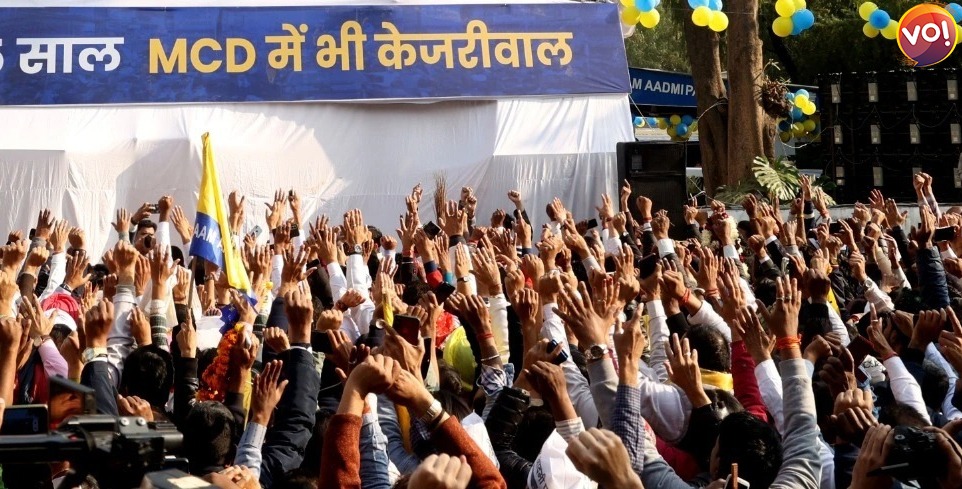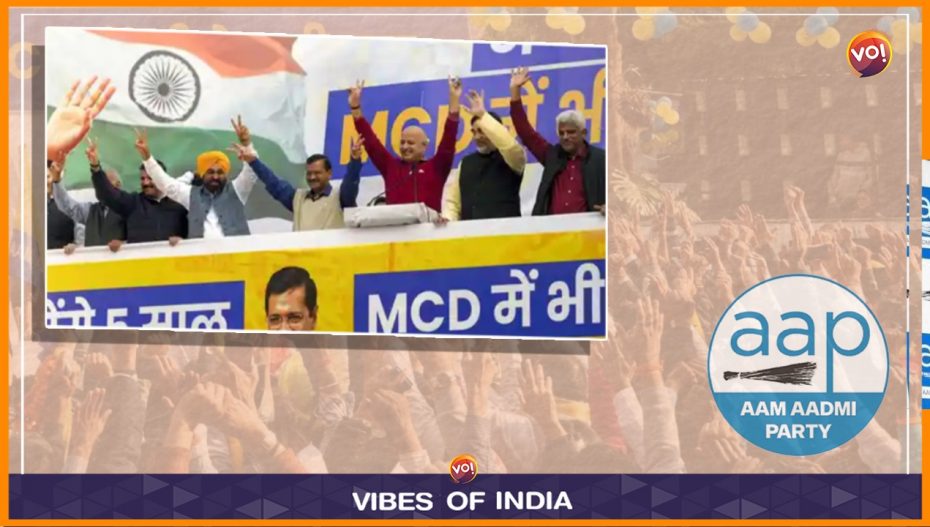On the eve of counting in Gujarat, where the Aam Aadmi Party (AAP) has invested enormously in its pursuit of acquiring the status of a national party, the AAP scored a victory in the Municipal Corporation of Delhi (MCD) polls on Wednesday. The AAP not only ended the BJP’s 15-year rule in the prestigious corporation that sits on a budget of Rs 15, 500 crore, but it also strengthened its position on its original political turf.
Delhi was where the AAP and its convener Arvind Kejriwal’s saga began, but the twisted power hierarchy in the national capital detracted from their authority to an extent. While Kejriwal has been the Delhi chief minister since 2015, he worked under the Centre’s proxy control exercised through the Lt Governor, who was rarely on the same page on vital issues. The MCD, under the BJP, denied Kejriwal a say in the conduct of civic matters without holding itself accountable. Citizens often held the AAP government culpable for the garbage pile-ups and potholed roads while their management — or mismanagement — lay squarely with the MCD.

By acquiring control over the MCD, the AAP hoped to exercise a more integrated management of Delhi’s affairs although there was still a catch. In 2012, the MCD was trifurcated into three regions ostensibly to ensure a fairer distribution of the budgetary estimates because there was a feeling that upscale South Delhi was a major recipient, while North and East Delhi were short-changed. The MCD elections scheduled to be held in April 2022 were inexplicably delayed.
In May this year, the Centre tweaked the Delhi Municipal Corporation Act and reunified the three bodies apparently to streamline the administration. The Union Home Ministry appointed a special officer, Ashwani Kumar, and empowered him with the authority to approve projects presented to him by the executive wings represented by a commissioner. Therefore, the Centre has not divested its say in the MCD’s running. The MCD will have an elected Mayor at the helm and that will be the AAP’s first challenge.
Also Read: AAP Secures Big Win In MCD Election, Ends BJP’s 15-Year Reign
With a comfortable majority after winning 134 of the 250 seats, the AAP should be able to see its candidate — the Mayor’s post will go to a woman in a rotational arrangement during the MCD’s five-year tenure — through. However, the anti-defection law does not apply to the civic body and councillors who cross-vote will not be subject to disqualification. Kejriwal has reportedly cautioned his elected councillors to “stay far away” from the BJP.
The outcome belied the exit poll projections which predicted an AAP sweep. The AAP crossed the halfway mark of 126 but lacked a cushion to make it less susceptible to the Opposition’s power play. Among the reasons for its showing, despite a sub-par turnout by voters, was a pronounced class divide that saw the less well-off in the resettlement colonies, slums, and other economically less well-off pockets turn up in far larger numbers to vote than the residents of the better-off islands who remained indifferent to a municipal election. It’s clear that the AAP has hollowed out the Congress’s Dalit following, although the BJP too bagged Dalit votes.
Kejriwal’s ability to “deliver” on his flagship schemes, notably in the education and health sectors, though disputed, went down well with large sections of the electorate. Based on the goodwill he earned through the “model” schools and mohalla clinics, he could articulate his promises to offer cleaner and more efficient civic infrastructure convincingly. However, it will take more than assurances to tidy up the mess left by the BJP.
The AAP failed on one score and that lay in the shift of the Muslim votes to the Congress, apparent in the minority-strong wards that went to the Congress. In pursuing a “soft” Hindutva image to compete with the BJP, the AAP refused to take a stand on issues that adversely impacted minorities. It was silent on the Citizenship Amendment Act, indifferent to the Shaheen Bagh protests that followed thereafter. It spoke eloquently on the Ayodhya temple, even promising Hindus a free yatra to the pilgrim town.
The tipping point was the 2020 communal violence in Delhi that came soon after Kejriwal won a mandate towards which Muslims contributed in no small measure. None of the AAP leaders visited the minority areas scarred by attacks. He suspended a Muslim councillor who was arraigned by the police on suspicion of instigating attacks on the Hindus. Then came the AAP’s investment in Gujarat which took the Hindutva agenda forward. Kejriwal’s demand to print the images of Hindu deities on currency notes became a talking point among Muslims. But given the polarised polity, the Congress will also likely tiptoe on the return of the Muslims to its fold, not wanting to be branded as an “appeaser” again.
In his moment of victory, Kejriwal tried to play the statesman and in a speech at the AAP headquarters, claimed the MCD would work without favouring any community. He went to the extent of saying he would ensure that those who didn’t vote for the AAP would get preference over the party’s voters.

The real story of the elections lay in the vote percentages secured by the parties and the BJP’s ability to keep its nose above water, contrary to the exit pollsters who projected a rout. The BJP might be down to 104 from its high of 181 in 2017, but its vote share increased from 38.7 in the 2020 elections to 39.2 in the civic polls. Conversely, the AAP’s share fell from 53.8 in 2020 to 39.3, while Congress rose from 4.3 to 12%. The BJP’s near-perfect organisational machinery even in Delhi where it lost power for years together ensured the presence of its voters at the booths in an election where the turnout was as low as 50.47%. It mobilised a high-pitched campaign that to an extent detracted from the AAP’s sheen and stature because it centred around the corruption charges against Kejriwal’s high-profile ministers, amped up by the investigations and raids from Central agencies.
Although the AAP got a much-needed morale booster, Kejriwal will be put on his toes from the get-go by a belligerent BJP and subject to scrutiny from an electorate looking for substantive change in the quality of the capital’s civic services.













